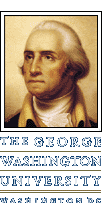|
August 4, 2004
CONTACT:
Matt Nehmer: (202) 994-6467; nehmer@gwu.edu
Joe Graf: (202)
994-6226; jgraf@gwu.edu
NEW REPORT LOOKS BACK AT ONLINE POLITICS IN
2000 AND
URGES RENEWED ATTENTION TO POLITICAL INFORMATION
ONLINE
GW's Institute for Politics, Democracy &
the Internet Reviews Nonpartisan Online Politics and Predicts 2004
Will See More People Looking for Political Information
Online
WASHINGTON - In the 2000 presidential
election, Web sites such as Voter.com, Freedom Channel.org and
DebateAmerica.org were heralded as an opportunity to engage
Americans in politics as never before. They offered an alternative
to political slogans and sound bites, and promised to revitalize
politics with substantive, nonpartisan
information.
It didn't turn out that way. The
dot-com crash helped shutter many of these Web sites after the
election. This was the finding of a new report, Pioneers in Online
Politics: Nonpartisan Political Web Sites in the 2000 Campaign,
released today by The George Washington University Institute for
Politics, Democracy & the Internet (IPDI). The report looks at
the celebrated collapse of online politics after the 2000 election
and urges a new roadmap for providers of nonpartisan political
information online.
Researchers commissioned by the
Carnegie Corporation of New York interviewed dozens of experts in
online politics and reviewed hundreds of documents to draft a
post-mortem on an election phenomenon that pioneered the "Internet
Alley" at the 2000 Republican National Convention, hours of free
online video of hundreds of candidates and a month long presidential
debate online.
"These Web sites were
portrayed as huge failures, but it was much more complicated," said
IPDI Director Carol Darr. "Just as online politics was overblown
before the 2000 election, its collapse was also overblown. The
innovations in online politics in the 2000 presidential election
were slightly ahead of their time, and we expect them to come back
around again soon."
Pioneers in Online Politics: Nonpartisan Political Web
Sites in the 2000 Campaign discusses:
* How the rare convergence
of entrepreneurs, innovators, technology and funding both helped and
harmed these innovative Web sites.
* How the dot-com crash
affected financing for these nonpartisan Web sites; and
* What
mistakes caused so many of these well-intentioned and well-connected
political innovators to founder so quickly.
Despite the collapse of many of the early nonpartisan Web
sites, new sites are beginning to take hold. Voters looking for
nonpartisan political information in 2004 can find a host of
resources:
* The League of Women Voters' DNet has partnered with Capitol
Advantage to provide an online database of election information (http://www.congress.org/).
Capitol Advantage provides the technical expertise and distribution
for information that will be seen by millions of Americans, most of
them in the last few weeks of the campaign.
* E-thepeople.org and
other sites have learned how to expertly manage and foster
Internet-based discussion, and host vibrant online discussion
communities.
* Web sites run by dedicated civic activists provide
a real public service. Examples include:
OnTheIssues.org (http://www.ontheissues.org/)
Democracy
In Action (www.gwu.edu/~action/P2004.html)
E-Democracy.Org/Minnesota
E-Democracy (http://www.e-democracy.org/)
Project
Vote Smart (http://www.vote-smart.org/)
Smart
Voter (http://www.smartvoter.org/)
The
California Voter Foundation (http://www.calvoter.org/)
Publius.org
(http://www.publius.org/)
Pioneers in Online Politics: Nonpartisan Political Web sites in
the 2000 Campaign is published by the Institute for Politics,
Democracy & the Internet in GW's Graduate School of Political
Management. Funded by a grant from The Pew Charitable Trusts, IPDI
is the premier center for research and advocacy on online politics
to increase citizen participation and uphold democratic values.
To download a copy of Pioneers in Online
Politics
and for more information about the institute, visit
www.ipdi.org.
For
more news about GW, visit the GW News Center at www.gwnewscenter.org.
- GW -
©1996-2004 The George Washington University Office of
University Relations, Washington, D.C.
Submit
questions/comments
| 

